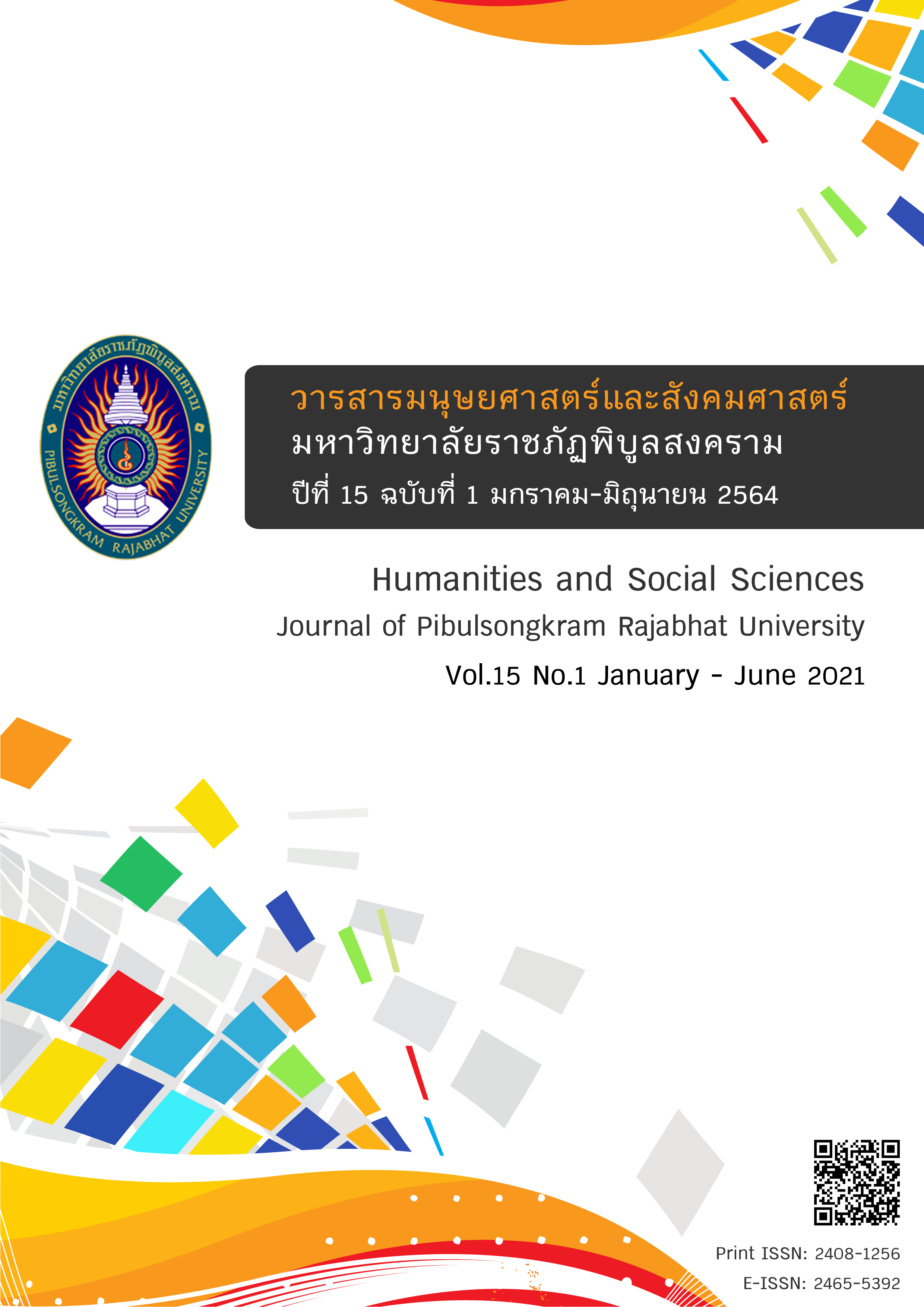The Priority Needs of Academic Management of Secondary Schools Based on The Concept of Digital Citizenship
DOI:
https://doi.org/10.14456//psruhss.2021.6Keywords:
Academic Management, Secondary School, Digital CitizenshipAbstract
The purpose of this research was to study the priority needs of academic management of secondary schools based on the concept of Digital Citizenship. The sample groups used in this research were 342 secondary schools by multi-stage random sampling. The contributors are divided into 2 groups, namely director or academic deputy director of the school and academic teacher. The instrument used in this study was a 5-level rating scaled questionnaire. The data were analyzed by frequency distribution, percentage, mean, standard deviation, and PNI modified. The findings indicate that: overall, the priority needs of academic management in secondary schools based on the concept of Digital Citizenship, the highest priority needs index was measurement and evaluation followed by curriculum development and learning management.. While considering each aspect, 1) curriculum development found that the highest index was to set learning standard to encourage learners to have digital health and wellbeing 2) learning management found that the highest index was to organize learning activities that encourage learners to have digital digital health and wellbeing 3) measurement and evaluation found that the highest index was a authentic assessment in digital health and wellbeing.
References
กมล ภู่ประเสริฐ. (2544). การบริหารงานวิชาการในสถานศึกษา. กรุงเทพฯ: ทิปส์พับบลิเคชั่น.
กระทรวงศึกษาธิการ. (2550). คู่มือการบริหารสถานศึกษาขั้นพื้นฐานที่เป็นนิติบุคคล. กรุงเทพฯ: โรงพิมพ์องค์การรับส่งสินค้าและพัสดุภัณฑ์ (รสพ.).
กระทรวงศึกษาธิการ. (2559). แผนปฏิบัติราชการ ประจำปีงบประมาณ พ.ศ. 2560 ของกระทรวงศึกษาธิการ (เพื่อประกอบการจัดทำคำของบประมาณรายจ่ายประจำปี พ.ศ. 2560. กรุงเทพฯ: สำนักนโยบายและยุทธศาสตร์ สำนักปลัดกระทรวง กระทรวงศึกษาธิการ.
กระทรวงเทคโนโลยีสารสนเทศและการสื่อสาร. (2559). แผนพัฒนาดิจิทัลเพื่อเศรษฐกิจและสังคม. กรุงเทพฯ: กระทรวงเทคโนโลยีสารสนเทศ.
กรมกิจการเด็กและเยาวชน. (2562). แนวทางปกป้องคุ้มครองเด็กจากภัยออนไลน์. สืบค้น 7 ตุลาคม 2562, จาก https://inetfoundation.or.th/
โชติกา ภาษีผล, ณัฏฐภรณ์ หลาวทอง และกมลวรรณ ตังธนกานนท์. (2558). การวัดและประเมินผลการเรียนรู้. กรุงเทพฯ: ภาควิชาวิจัยและจิตวิทยาการศึกษา คณะครุศาสตร์ จุฬาลงกรณ์มหาวิทยาลัย.
นพพงษ์ บุญจิตราดุลย์. (2551). โน้ตย่อบริหาร. เชียงใหม่: ออเร้นจ์ กรุ๊ป ดีไซด์.
ปองสิน วิเศษศิริ. (2555). เอกสารประกอบการสอนวิชา 2747732 การบริหารงานวิชาการกับการประกันคุณภาพการศึกษา. กรุงเทพฯ: จุฬาลงกรณ์มหาวิทยาลัย.
ปรียาพร วงศ์อนุตรโรจน์. (2553). การบริหารงานวิชาการ. กรุงเทพฯ: ศูนย์สื่อเสริมกรุงเทพ.
รุ่งชัชดาพร เวหะชาติ. (2551). การบริหารงานวิชาการสถานศึกษาขั้นพื้นฐาน (พิมพ์ครั้งที่ 2). สงขลา: นำศิลป์โฆษณา.
วรพจน์ วงศ์กิจรุ่งเรือง. (2561). คู่มือพลเมืองดิจิทัล. กรุงเทพฯ: สำนักงานส่งเสริมเศรษฐกิจดิจิทัลกระทรวงดิจิทัลเพื่อเศรษฐกิจและสังคม.
สำนักงานเลขาธิการสภาการศึกษา. (2557). แนวทางการพัฒนาการศึกษาไทยกับการเตรียมความพร้อมสู่ศตวรรษที่ 21. กรุงเทพฯ: พริกหวานกราฟฟิค.
สรานนท์ อินทนนท์. (2562). การบริหารจัดการเวลาบนโลกดิจิทัล. ปทุมธานี: วอล์ค ออน คลาวด์.
สำนักข่าวอิศรา. (2561). 10 สถานการณ์เด็กไทยกับสื่อออนไลน์ เสี่ยงติดเกม เป็นเหยื่อ กลั่นแกล้ง และสื่อลามาอนาจาร. สืบค้น 16 เมษายน 2561, จาก https://is.gd/4qxAz2
สำนักงานปฏิรูปการศึกษา. (2545). แนวทางบริหารและการจัดการศึกษาในเขตพื้นที่การศึกษาและสถานศึกษา. กรุงเทพฯ: สำนักงานปฏิรูปการศึกษา.
สุกัญญา แช่มช้อย. (2560). การบริหารสถานศึกษาในยุคดิจิทัล. กรุงเทพฯ: จุฬาลงกรณ์มหาวิทยาลัย.
Common Sense Media. (2015). Our K-12 Digital Citizenship Curriculum. San Francisco: Common Sense Media.
Council of Europe. (2017). Digital citizenship education : Empowering digital citizenships. Strasbourg: The council of Europe.
Davis, V. (2014). What Your Students Really Need to Know About Digital Citizenship. Retrieved February 4, 2018, from https://www.edutopia.org/blog/digital-citizenship-need-to-kn
Giumetti, G. W., Kowalski, R. M. (2016). Cyberbullying Matters: Examining the Increental Impact of Cyberbullying of Outcomes Over and Above Traditional Bullying in North America. In R. Navaro, S. Y., & Larranaga, E. (Eds.), Cyberbullying across the grobe. New York: Springer.
Johnson, D. (2003). Learning Right from Wrong in the Digital Age: An Ethics Guide for Parents, Teachers, Librarians, and Others Who Care About Computer-Using Young People. Linworth: Illustrated edition.
Park, Y. (2017). Digital Intelligence (DQ). Singapore: DQ Institute.
Ribble, M. (2011). Digital Citizenship in Schools. International Society for Technology in Education. Eugene, Oregon: The International Society for Technology in Education.
UNESCO. (2017). Digital Citizenship Education in Asia-Pacific Outcome Document. Conference on Digital Citizenship Education in Asia-Pacific. Bangkok: UNESCO Asia and Pacific Regional Bureau for Education.
Yamane, T. (1973). Statistics: An Introductory Analysis (3rd ed.). New York. Harper and Row Publications.
Downloads
Published
How to Cite
Issue
Section
License
Any articles or comments appearing in the Journal of Humanities and Social Sciences, Rajabhat Phibulsongkram University, are the intellectual property of the authors, and do not necessarily reflect the views of the editorial board. Published articles are copyrighted by the Journal of Humanities and Social Sciences, Rajabhat Phibulsongkram University.









